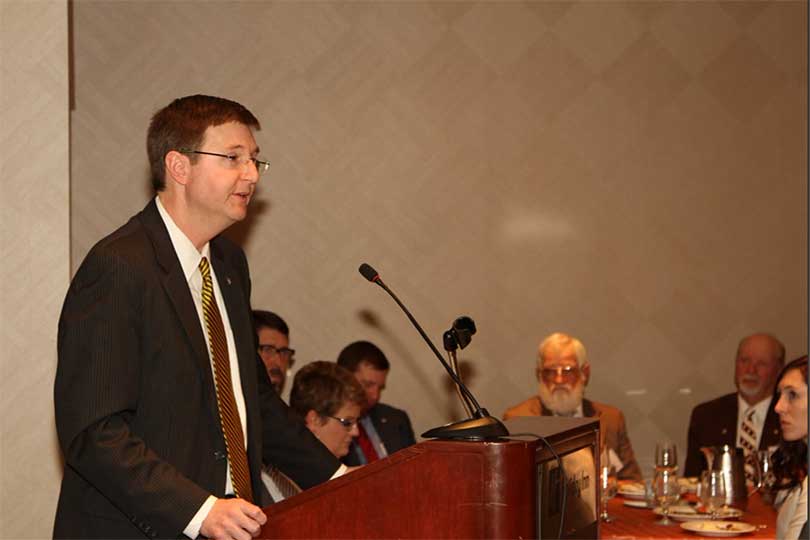By Jessica Domel
Multimedia Editor
Texas Farm Bureau members in Washington, D.C. this week received an inside look at what President Donald Trump has planned for American agriculture.
Ray Starling, special assistant to the president for Agriculture, Trade and Food Assistance, spoke to members on the first night of their National Affairs and Awards Trip week in the nation’s capital.
Starling said the administration has identified four categories where work can be done to help farmers and ranchers.
“We have got to promote agricultural trade. It’s at the top of our list, and we understand that we produce far more in this country than we consume, and to find a place for those goods is imperative for us in terms of keeping our economy in the ag world strong,” Starling said.
President Trump is committed to negotiating agreements that secure open and equitable access to existing and new markets, insisting on the use of sound science when scientific judgments are implicated, eliminating tariffs and subsidies that unfairly disadvantage our products and holding trade partners accountable when they invoke unfair or unjustified market practices.
“To use the president’s terminology, agriculture already helps us win in the race to trade more, and we will make sure agriculture continues to win in that regard,” Starling said.
The administration will also work to ensure farmers, ranchers and dairymen have access to a reliable, affordable workforce.
“That problem is going to be solved in the context of bigger conversations about national security, but I can assure you that ag is on the list,” Starling said. “And we will be working to try to find a solution to stabilize the current workforce and to stabilize the workforce that comes and goes largely through guest worker programs like H-2A.”
Halting the regulatory onslaught is also on the administration’s list.
“For years, our farmers and ranchers have been the victim of one regulatory proposal right after another,” Starling said. “Consistent with the president’s already issued executive order on regulatory reform, significant care is going to be given by the administration to evaluate existing landscape to determine how to make it less onerous and to implement changes that lessen what I call cumulative layers of regulation.”
For this to work, Starling said the administration will have to look across all agencies.
Improving the infrastructure in rural America is also a goal of the administration.
“Agriculture and rural America frequently deal with challenges that are different than those that impact the rest of our society,” Starling said. “Even when those challenges are the same as those faced by our urban and suburban counterparts, the solutions that we need for rural America may need to be different.”
He said the president realizes those in agriculture have been “astonishingly successful in providing food, fiber and forestry products to America at least partly because of agriculture’s infrastructure.”
The president will also brag more about ag, according to Starling. He said President Trump was the first president in 16 years to make the national declaration of National Ag Day, and it’s something he did proudly.
Starling also went on to clarify what the Trump administration will not do to American agriculture, starting with proposing a reading of the Clean Water Act that gives the federal government an opportunity and the jurisdiction to “regulate every ditch and mud hole on your property.”
“We can have coexistence of successful, productive agriculture and respect our treasured wildlife at the same time,” Starling said.
The administration will also not allow the release of sensitive and private data on farmers “just because ecologically-driven fanatics and lawyers want access.”
Under President Trump, the EPA will not be allowed to give taxpayer dollars to activist groups who then turn around and buy billboard space attacking farmers.
The administration will also not lose sight of the fact that the number one farm preservation tool is farm profitability, Starling said.
“Making sure that you’re making money is the best way to make sure that you’re farming next year. We get that,” he said.
Tuesday, TFB members on the trip will hear from American Farm Bureau Federation staff and Congressman Ke


I have adjudicated water rights on the San Saba River in Menard County. We have been in battles with TCEQ about taking our water rights. The lobbyist group “The Friends of the San Saba” want to ignore that we have an Underground Water Board and an Above Ground Water board in place to protect the waters of the San Saba River. TCEQ wants to add regulates to our adjudicated water. It is big government interference which will increase tax payers cost and will be redundant. TCEQ also wants to expand to regulate our well water rights. We do that at a local level and do not need government interference,regulations or cost. We are a small agricultural community and would like to be able to afford our way of life. Added regulations and the cost to implement those regulations are going to destroy this community.